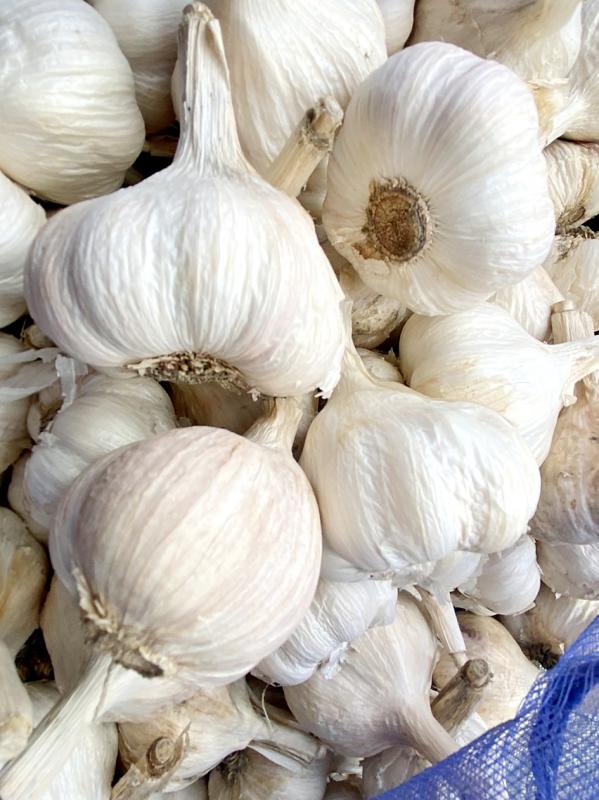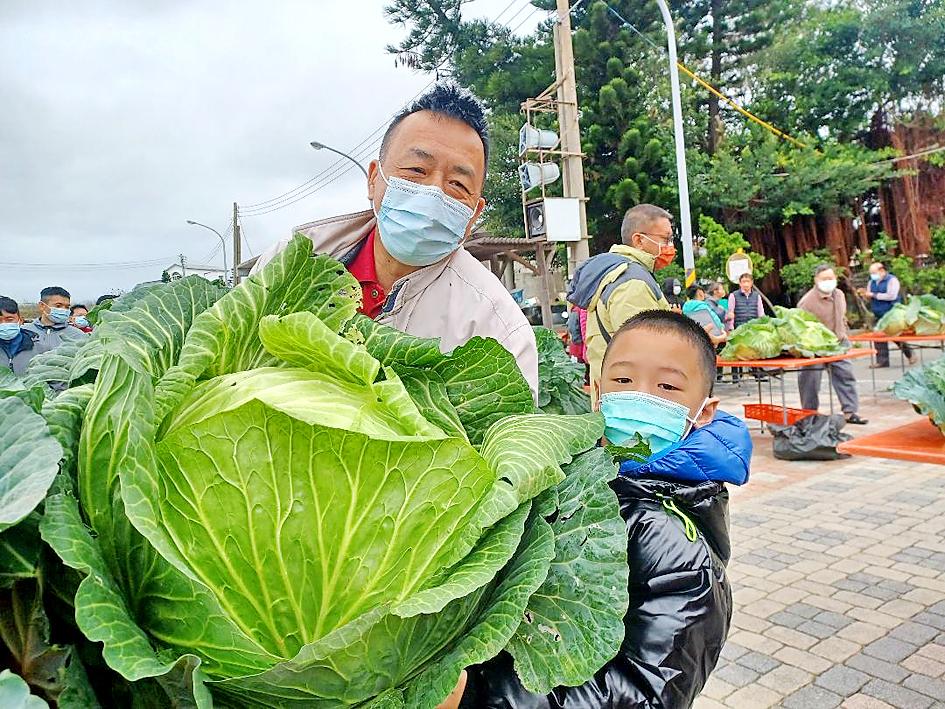The nation’s favorite vegetables are Taiwanese cabbage, yam leaves and bok choy, while raw garlic is the least popular, a poll showed.
Results of the “Stars of Taiwanese dishes and cooking” online poll was released in Taipei on Wednesday. The survey, which collected opinions on the six major food categories, was organized by the Taiwan Millennium Health Foundation, the Health Promotion Administration (HPA) and the Council of Agriculture.
Taiwan’s most popular fruits were bananas, dragon fruit and Asian pear; while tofu, salmon and eggs topped the list in the “Meat, Fish, Eggs and Legumes” category.

Photo: Chan Shih-hung, Taipei Times
White rice, noodles and multi-grain rice topped the “Cereals and Whole Grains” category, while the “Dairy Products” category was led by milk, followed by yogurt drinks and yogurt.
The favorites in the “Nuts” category were walnut, pine nut and pistachio.
Garlic was the least favorite in the “Vegetables” group, followed by brown-cap white mushrooms (Hypsizygus marmoreus) and Okinawa spinach, while Durian was the least popular fruit.

Photo: Liu Yu-ching, Liberty Times
Fried dough sticks (youtiao, 油條), mock ham, evaporated milk and flaxseed were the least favorite foods in the “Cereals and Whole Grains,” “Meat, Fish, Eggs and Legumes,” “Dairy Products,” and “Nuts” categories respectively.
The survey collected responses from 172,000 people. Respondents in the 30-to-39 age bracket made up the largest group, accounting for 34.2 percent of all respondents, followed by the 40-to-49 age bracket.
Pan Wen-han (潘文涵), a researcher at Academia Sinica’s Institute of Biomedical Sciences, said garlic was the least popular vegetable because Taiwanese do not like eating it raw, as it is usually sliced and sauteed to lend its aromatic flavor to Taiwanese dishes.
Most Taiwanese still prefer eating white rice and noodles, but they should consume more whole rice and multigrains, which can protect from cardiovascular disease, Pan said.
Pan said people should limit consumption of deep-sea fish to twice a week, due to possible high heavy metal content, which could affect coagulation and other blood functions.
People should check the glycemic index of fruits, Pan said, adding that, for example, banana is among the favorites in the poll, but elderly or diabetic people should for not eat too much of the fruit in one sitting.
“Studies in other countries have shown that vitamin D deficiency could increase the risk of COVID-19 infection by 77 percent, which is likely due to enhanced immunity gained from vitamin D and of its function to diminish inflammation in the body,” she said. “Drying mushrooms under the sun can boost their vitamin D levels. So people can boost vitamin D intake by eating more sun-dried mushrooms and fungus.”
Taiwan Millennium Health Foundation chairman Hsu Huei-heng (許惠恒), an expert in diabetes treatment, said the poll provides opportunities for public nutrition awareness, for example by introducing people to the six major food groups, and presenting charts and graphics to educate the public on daily recommended allowances.
Poll results, alongside data from the HPA, could help people create daily meal plans, for example two portions of dairy products, three portions of vegetables and two portions of fruit, and more whole grains to remain healthy and protect against metabolic syndromes, Hsu said.
HPA Director Wu Chao-chun (吳昭軍) said people should consume a variety of food products to maintain proper nutrient intake, which is necessary for a healthy body, as the nation faces a surge in COVID-19 infections.
Additional reporting by Jason Pan

Three batches of banana sauce imported from the Philippines were intercepted at the border after they were found to contain the banned industrial dye Orange G, the Food and Drug Administration (FDA) said yesterday. From today through Sept. 2 next year, all seasoning sauces from the Philippines are to be subject to the FDA’s strictest border inspection, meaning 100 percent testing for illegal dyes before entry is allowed, it said in a statement. Orange G is an industrial coloring agent that is not permitted for food use in Taiwan or internationally, said Cheng Wei-chih (鄭維智), head of the FDA’s Northern Center for

LOOKING NORTH: The base would enhance the military’s awareness of activities in the Bashi Channel, which China Coast Guard ships have been frequenting, an expert said The Philippine Navy on Thursday last week inaugurated a forward operating base in the country’s northern most province of Batanes, which at 185km from Taiwan would be strategically important in a military conflict in the Taiwan Strait. The Philippine Daily Inquirer quoted Northern Luzon Command Commander Lieutenant General Fernyl Buca as saying that the base in Mahatao would bolster the country’s northern defenses and response capabilities. The base is also a response to the “irregular presence this month of armed” of China Coast Guard vessels frequenting the Bashi Channel in the Luzon Strait just south of Taiwan, the paper reported, citing a

The Chinese military has built landing bridge ships designed to expand its amphibious options for a potential assault on Taiwan, but their combat effectiveness is limited due to their high vulnerability, a defense expert said in an analysis published on Monday. Shen Ming-shih (沈明室), a research fellow at the Institute for National Defense and Security Research, said that the deployment of such vessels as part of the Chinese People’s Liberation Army (PLA) Navy’s East Sea Fleet signals a strong focus on Taiwan. However, the ships are highly vulnerable to precision strikes, which means they could be destroyed before they achieve their intended

UNDER PRESSURE: The report cited numerous events that have happened this year to show increased coercion from China, such as military drills and legal threats The Chinese Communist Party (CCP) aims to reinforce its “one China” principle and the idea that Taiwan belongs to the People’s Republic of China by hosting celebratory events this year for the 80th anniversary of the end of World War II, the “retrocession” of Taiwan and the establishment of the UN, the Mainland Affairs Council (MAC) said in its latest report to the Legislative Yuan. Taking advantage of the significant anniversaries, Chinese officials are attempting to assert China’s sovereignty over Taiwan through interviews with international news media and cross-strait exchange events, the report said. Beijing intends to reinforce its “one China” principle